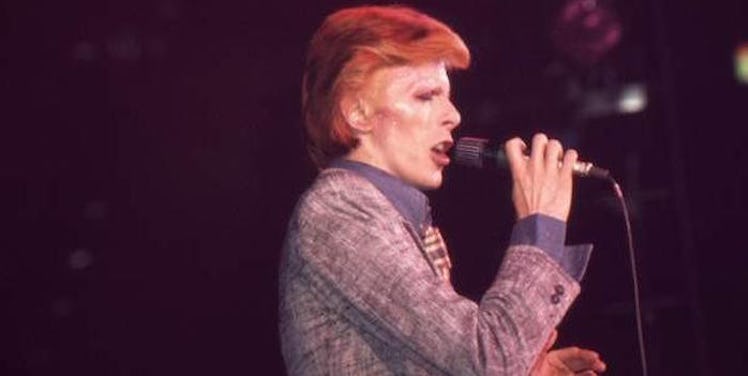
6 Political Statements You Had No Idea David Bowie Made
I was at this hipster bar in Brooklyn last year trying to look cool and aloof like everyone else. But then David Bowie's "Space Oddity" started playing.
My friends and I started reciting along with Major Tom and ground control, growing louder in spirit as we caught the excitement in each other's eyes.
One by one around us, groups joined in. The tattooed bartender leaned across the bar to act out the epic space tragedy. It was like an electric spark spreading around the bar until we were all shouting together, hipster aloofness be damned.
We really lost one of the best on Sunday. David Bowie, 69, influenced music across genres, from varieties of rock to pop to rap, as the spread of musicians paying their respects shows.
One thing made clear this morning: Even if you don't care about Bowie, you know your favorite artist does very deeply. — Steven Hyden (@Steven_Hyden) January 11, 2016
Aside from his massive effect on music, though, Bowie worked to influence political culture -- in more ways than just making hipsters break character. Here are some of Bowie's biggest political statements.
Bowie called out MTV for not playing black musicians.
In the middle of an interview with MTV's Mark Goodman in 1982, Bowie started asking Goodman questions.
Bowie asked why MTV was showing so few black musicians on the channel. When Goodman tried to make corporate excuses, Bowie kept pressing him.
Bowie said:
Is it not possible it should be a conviction of the station and of the radio stations to be fair ... to make the media more integrated?
The "Let's Dance" music video was about Aboriginal Australians.
Bowie's classic song "Let's Dance" had a video filmed in Australia that centered on a young Aboriginal couple.
Bowie called the video "a direct statement on integration," and it included references to domestic slavery, 1950s British nuclear testing and the stolen generation of Aboriginal children who were taken away from their families.
Larissa Behrendt told the Guardian:
There was a real ignorance about Indigenous issues back then, a stigma about being Aboriginal. So to see a video that celebrated being Indigenous, that had a beautiful young girl as the star and a handsome young Aboriginal boy as the hero, was something I’d never seen before. It was a hugely important. And he did it without being preachy – or with any agenda.
Bowie and Mick Jagger's ridiculous video for their cover of "Dancing In The Street" was actually for Live Aid.
The video was outrageous enough to be used in Family Guy, but the duo really recorded it for 1985's Live Aid, a benefit concert for famine-stricken people in Africa.
Bowie performed at the Live Aid concert in London to a frenzied crowd.
It wasn't the only time Bowie performed for a charity -- he also performed for Save The Children and Amnesty International's 1997 Refugee Campaign.
Bowie asked Scotland not to become independent.
In 2014, there was a vote to decide if Scotland should gain independence from the United Kingdom. At the Brit Awards that year, Bowie won best British male solo artist.
He didn't go to the ceremony but sent Kate Moss up to read a short speech. The speech ended, simply, with this:
Scotland, stay with us.
Scotland did end up staying with the UK in the vote that year. But that didn't stop some Scottish nationalist assh*les from apparently celebrating Bowie's death.
Germany thanked Bowie for helping bring down the Berlin Wall.
Bowie moved to Berlin in the 70s. He wrote his famous song "Heroes" there, seeing a couple kissing by the East German border. The lyrics say:
I can remember / Standing by the wall / And the guns shot above our heads / And we kissed, as though nothing could fall.
In 1987, Bowie went back to Berlin and performed on the western side of the Berlin Wall, loud enough that people in East Germany could hear.
It led to riots, and that same week Ronald Reagan called on Gorbachev to "tear down this wall."
The German Foreign Office tweeted its thanks to Bowie on Monday:
Bowie served as an icon for people struggling with identity and acceptance.
In 1972, Bowie said he was gay, then four years later said he was bisexual. Over time, he flip-flopped on his label of sexual orientation -- but that didn't stop him from helping LGBTQ people around the world. He was also, of course, known for his androgynous looks and endless exploration of gender.
Bowie was this massive star who came out and said he didn't particularly fall into a cis, straight category. For people struggling with their own identity, this was huge.
In everything he did and was, Bowie broke from the norm and what was considered proper. He was unusual, funny, at times awkward and always unique. He did what he wanted and looked how he wanted and didn't really care what people thought.
Bowie showed that it was totally alright to just be you.
The least we can do to honor Bowie's life and legacy is to live completely as ourselves, heartily screaming out "Space Oddity," even if you think it'll make you look uncool.